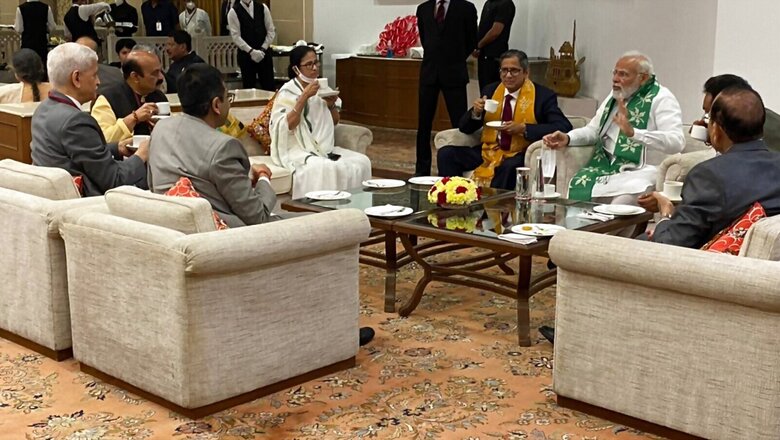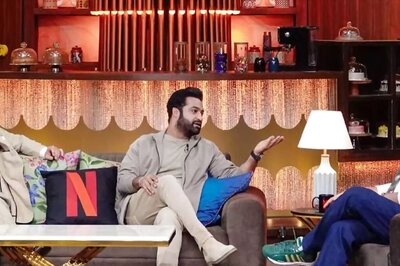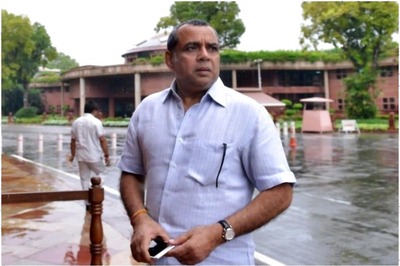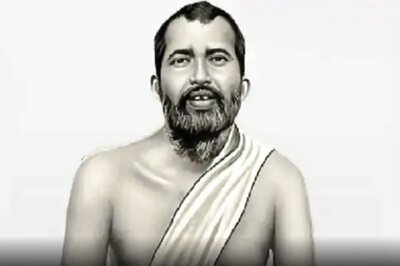
views
Prime Minister Narendra Modi on Saturday made a strong pitch for use of local languages in courts, contending that it will increase the confidence of common citizens in the justice system and they will feel more connected to it.
“We need to encourage local languages in courts. This will not only increase the confidence of common citizens in the justice system but they will feel more connected to it,” PM Modi said, addressing the joint conference of chief ministers and chief justices of high courts.
PM Modi’s statement came days after Kannada star Kichha Sudeep said that Hindi is “no longer a national language”, considering the success of South Indian films. Hitting back at the actor, Ajay Devgn asked him on Twitter why the south industries dub films in Hindi then.
The issue snowballed quickly, with Karnataka chief minister Basavaraj Bommai supporting Sudeep’s statement. “Regional languages are important and the respective states follow their regional language that what Sudeep said and he is right. Everyone should respect this,” he told reporters in Hubballi.
Earlier too PM Modi has vouched for local languages. Speaking on the occasion of World Health Day, PM Modi said that the decision to massively transform medical education in the last eight years has enabled the study of the specialisation in local languages. He added that this will give wings to the aspiration of many youngsters who wish to pursue a career in medical science.
Union home minister Amit Shah, who is also chairperson of the Official Language Committee, is of the view that Hindi should be accepted as an alternative to English, and not local languages. He suggested that Hindi should be made more flexible by accepting words from other local languages.
The home minister has also stressed on the need to give elementary knowledge of Hindi to students up to Class IX and pay more attention to Hindi teaching examinations.
According to MHA, Shah informed members of the panel, earlier in April, that 70 per cent of the agenda of the Cabinet is now prepared in Hindi. He said 22,000 Hindi teachers have been recruited in the eight states of the Northeast, and nine tribal communities of the region have converted scripts of their dialects to Devanagari.
Meanwhile, at the joint conference of chief ministers and chief justices of high courts, PM Modi further stated that while the judiciary is the custodian of the Constitution and the legislature has the mandate to represent the aspirations of the people.
“In our country, while the role of the judiciary is that of the guardian of the constitution, the legislature represents the aspirations of the citizens. I believe that this confluence of these two will prepare the roadmap for an effective and time-bound judicial delivery system in the country,” the prime minister said.
He said that the “75 years of India’s independence have clarified the roles and responsibilities of the judiciary and executive”. “Wherever necessary, this relation between judiciary and executive has evolved to give direction to the country,” the prime minister stated.
Further, PM Modi also stressed the need for a digital judicial system which can empower citizens. “To strengthen citizens, technology has become an important tool. Likewise, our judicial infrastructure needs to be digitalised too.
Tech-friendly human resources play an important role in integrating Digital India with the nation’s growth story. Blockchain, cyber security, robotics, AI (Artificial Intelligence) all are being taught in colleges,” he added. Speaking about online payments, the prime minister said that digital transactions are now becoming common in small towns and villages.
“Today, digital transactions are becoming common in small towns and villages. Out of all the digital transactions that took place in the world last year, 40 per cent of them took place in India,” he said.
Union minister of law and justice Kiren Rijiju, Chief Justice of India NV Ramana, Delhi chief minister Arvind Kejriwal, Chhattisgarh chief minister Bhupesh Baghel, Assam chief minister Himanta Biswa Sarma, Arunachal Pradesh chief minister Pema Khandu, Meghalaya chief minister Conrad Sangma and Punjab chief minister Bhagwant Mann were also present at the joint conference.
The joint conference is an occasion for the executive and the judiciary to come together to create frameworks for simple and convenient delivery of justice and to discuss steps required to overcome the challenges facing the justice system, according to PMO.
Read all the Latest India News here




















Comments
0 comment